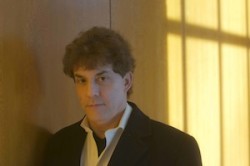The Right-Hand Shore
by Christopher Tilghman

The Right-Hand Shore: A Novel
by Christopher Tilghman
368 pp., Picador
$26.00
Sixteen years ago, Christopher Tilghman’s debut novel, “Mason’s Retreat,” appeared to a plethora of praise. It depicted the story of Edward Mason, a pre-World War II businessman, who moved his wife and children from England to re-claim his family’s nearly ruined ancestral home on the Eastern Shore of Maryland.
Now, the author has written a prequel, “The Right-Hand Shore.” It continues the Mason lore, retroactively, from their slave owning days of the 1850s, to 1920 — the year of Mary Bayly’s cancer. She is Mistress of the Retreat — as the estate is known — a Mason granddaughter, and Dairy entrepreneur of the region.
As her death edges up, Mary’s wish is to locate a direct descendant to manage — and hold – her beloved 1,000-acre property. When Edward shows, he surmises their visit will be perfunctory — brief enough to bewitch Mary, return to Baltimore for lunch with a new inheritance — possibly — and sail for Europe.
Tilghman’s prose is so beautiful that it enraptures the reader in much the same way the employees’ recollections captivate Edward. In a nine-hour interval, the Retreat accrues mental momentum for him, and by the end, it is a place he — appreciates.
Edward learns of Mary’s grandfather, “Duke”, who squeezed out a bargain to sell all his field slaves at “… what might have seemed thirty cents on the dollar … the weasel-faced man from Virginia just couldn’t stop himself from panting with pleasure, cackling as he counted out the money …”
For “Duke” Mason, the deadpan deal was only “… a windfall … pure profit …” without contemplating the consequences to the persons-to-be-sold: splitting up families — for keeps. Mary’s mother, Ophelia, who witnessed it “… was fifteen years old … and she was crying. She knew these people …” and because of it, carried a permanent shame. Home is transformed into place to escape.
When Mary wed the Lincolnesque Wyatt Bayly, he intended to rub out those memories, by re-tilling the soil into a huge peach orchard. But, after Mary and Thomas were born — during which the arc of his success was at its highest – Ophelia bolted to Paris, and enrolled Mary in a fancy Catholic school, while she hopscotched among the Society Soirees between Paris and Baltimore.
Their son, Thomas, was left behind, with little company except for a distracted father, a coterie of ex-house slaves, Randall, the son of the Head Orchardist, and his beautiful, lonely sister, Beal, whom Thomas revered.
It was an unsupervised life for Thomas, but through Tilghman’s magnifying glass, this protracted circumstance enlarged the possibilities for the Thomas-Beal relationship — from a tantalizing taboo, to a forbidden marriage.
Tilghman writes about racial tension, powerfully. And, while Ophelia thought she could dodge it, her chronic absences from the Retreat fired an emotionally vacuous profile that bifurcated her progeny; among Randall Terrell’s relations, the after-effects came — irrevocably — with Randall’s murder, the Thomas-Beal union, and their Mason déjà vu “return” to France — as exiles.
 David Bruce Smith is the author of 11 books and founder of the Grateful American™ Foundation, which is restoring enthusiasm about American history for kids — and adults — through videos, podcasts, and interactive activities.
David Bruce Smith is the author of 11 books and founder of the Grateful American™ Foundation, which is restoring enthusiasm about American history for kids — and adults — through videos, podcasts, and interactive activities.




